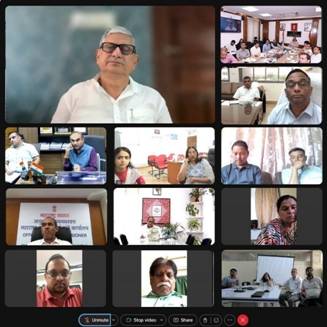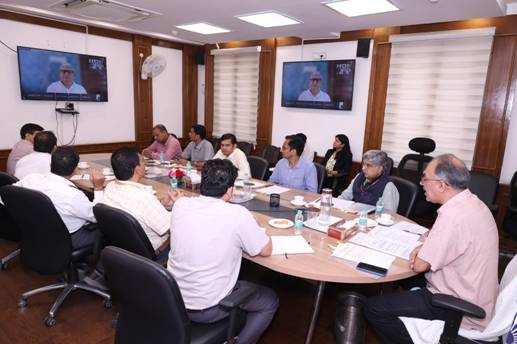Ministry of Fisheries, Animal Husbandry & Dairying
Union Minister Shri Rajiv Ranjan Singh Chairs IGoM Stakeholders Consultation on Fisheries Sector Reforms
“Unlocking Inland States’ Export Potential and Increasing Fish Productivity are Key to India’s Global Competitiveness”: Shri Rajiv Ranjan Singh
Stakeholders Call for Infrastructure Support and Brand India Promotion to Strengthen Seafood Exports
Posted On:
06 SEP 2025 6:15PM by PIB Delhi
A Stakeholders Consultation Meeting under the Informal Group of Ministers (IGoM) on Social, Welfare and Security Sectors for the Department of Fisheries under the Ministry of Fisheries Animal Husbandry and Dairying (MoFAHD) was held today in hybrid mode to invite suggestions on the four pillars of the IGoM(legislative, policy, institutional, and process reforms) for the fisheries sector. The meeting was virtually chaired by Union Minister, MoFAHD and Panchayati Raj, Shri Rajiv Ranjan Singh alias Lalan Singh. Secretary, Department of Fisheries (DoF) Shri Abhilaksh Likhi steered the consultation and feedback session aimed at identifying the challenges and reforms for enhancing production, productivity and exports promotion in the fisheries sector in line with the vision of becoming Viksit Bharat by 2047.


While addressing the meeting, Shri Rajiv Ranjan Singh emphasized that the suggestions from the stakeholders were essential to help in preparing a reform roadmap that focuses on significantly enhancing production, productivity and exports for the fisheries sector. The Union Minister underscored the need to unlock the untapped export potential of inland states to diversify and strengthen India’s seafood export portfolio. He welcomed the recent next generation GST reforms under the leadership of Prime Minister Shri Narendra Modi and said that this step will give a major boost in enhancing the competitiveness of the sector. The Union Minister urged the stakeholders to make collective efforts to improve fish productivity from 5 Ton per Hectare to 7 Ton per Hectare in India to remain globally competitive.
Emphasis was also laid by the Union Minister on export market diversification, certification of produce, technology integration in fish processing, building cold chain infrastructure, enhancing processing capabilities and establishing a robust traceability system to meet global benchmarks. Shri Singh stated that the fisheries sector directly and indirectly supports over 8 crore livelihoods in the country. He affirmed the Government’s commitment to the structural transformation of the sector and noted that the IGoM has been constituted with a clear mandate to develop a comprehensive reform roadmap anchored on four key pillars—legislative, policy, institutional, and process reforms. These pillars, he emphasized, will guide the creation of a resilient, inclusive, and export-oriented fisheries ecosystem.
Dr. Abhilaksh Likhi, Secretary, DoF in his address, highlighted the untapped export potential of the fisheries sector and stressed upon the importance of enhancing its productivity. He urged States/UTs, fishermen associations, exporters, and industry bodies to work in close collaboration and share actionable suggestions.
Joint Secretary, Shri Sagar Mehra, DoF stated that the IGoM will drive reforms through sectoral assessments to identify pain points, challenges in the global benchmarking and current gaps in capacity-building. In his presentation, he highlighted the expansion of marine and inland aquaculture, promotion of high-value species with GI tagging, strengthening of infrastructure, and greater private investment through PPP models.
The meeting also discussed the need to align state-level strategies with PMMSY, PM-MKSSY scheme and the Blue Economy initiative. During the meeting, the Stakeholders across the spectrum gave their valuable inputs on issues like development of quarantine centres, technology use for value addition, increasing processing capabilities, need for single window clearance, enhanced traceability, need for uniform land leasing policy/ power tariffs, robust infrastructure, setting up of cold storage along with modern markets and transportation facilities, development of seed banks for quality seeds, better access to credit for farmers etc. It was highlighted that focused training institutes for value addition will help in increasing farmer productivity and establishment of export facilitation counters across the country will facilitate exports. The discussion focused on establishing regional centres of excellence, developing capacity-building modules for emerging job roles, expanding saline aquaculture, promoting eco-labelling, and strengthening Brand India by diversifying high-value species exports to enhance market resilience.
The meeting was attended by a wide spectrum of stakeholders including senior officials from the Department of Fisheries, MoFAHD, States/UTs, NFDB, MPEDA, ICAR institutes, Coastal Aquaculture Authority, Fishery Survey of India, DoF field institutes, representatives of fishermen associations, industry bodies (FICCI, CII, ASSOCHAM, PHD Chamber) as well as officials from various Central Ministries/Departments under the IGoM.
****
Aditi Agrawal
(Release ID: 2164386)
Visitor Counter : 486